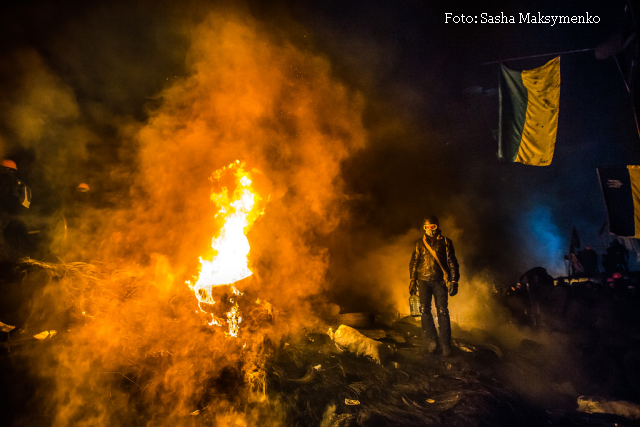Quo Vadis Ukraine?
Ukraine of late has been the stage of massive protests, official buildings taken over, officials brutalized, statues taken down, prompting a repression that has left people dead and injured, with others getting abducted and tortured.

Bogdan Matei, 07.02.2014, 12:29
Since the autumn, when President Viktor Yanukovich refused at the last minute to sign the Association and Free Trade Agreements with the EU, in favor of relations with Russia, gradually Ukraine turned into a battlefield between pro-Western protesters and the police of the pro-Russian regime. Predictably, the events prompted reactions from the EU and the US, which accused the regime of provoking the escalation of violence.
European Commission President Jose Manuel Barroso warned that the repression could have serious consequences on relations between Brussels and Kiev. The American embassy in Kiev announced that Washington cancelled visas for Ukrainian officials. In Moscow, the government elite is convinced that the clashes were staged and financed by the West. Russian Foreign Minister Sergei Lavrov accused the EU of supporting what he called the “pogroms” perpetrated by protesters in Kiev. The Kremlin press secretary Dimitri Peskov claimed that the West wants to undermine the Winter Olympics in Sochi by fueling the revolt, out of envy towards a Russia which he described as “strong, successful, rich and healthy”.
For political scientist Dan Dungaciu, specializing in the ex-Soviet space, the situation is not only an internal political game, it is about belonging to a certain model of civilization.
Dan Dungaciu: “In my opinion, this moment in Kiev is the perfect example of the rift with the East, which is as yet unclear. The confrontation in this area is, if you will, a geopolitical zero sum game. What one side loses, the other gains. Right now we are looking at the border of the Euro-Atlantic space getting negotiated, or, if you look from the East, a drawing of its border. This happens in Kiev right now, if we look at it from far enough.”
The resignation of the Mykola Azarov cabinet, which orchestrated the repression, changing antidemocratic laws and creating a commission for amending the Constitution are all concessions which the ruling power has made in order to obtain a cease-fire with the protesters. The head of the Center for Promoting Romanian traditions in Cernauti, Iurie Levcic, is one of the roughly half a million ethnic Romanians in Western Ukraine. He does not believe that the calm situation will be lasting.
Iurie Levcic: “Nothing has been solved so far, in spite of small victories, such as Azarov’s resignation and the cancellation of laws issued on 16 January, people will not calm down, because they no longer believe in this regime. They have been lied to many, many times. The people in power have changed their position too many times, and now people are willing to go the entire way, especially since the opposition is drawing up a more visible plan of battle against this regime.”
Analysts with the Bucharest Center for the Prevention of Conflicts warn that the inability of the regime to quell social tensions could lead to a civil war. This would pit western Ukrainian regions, who are pro-Western, against eastern areas with pro-Russian population. Some expect a split of the country along the same geopolitical rift.
Dan Dungaciu, however, does not endorse such scenarios: “There is no way the two sides in Ukraine, those pulling east and those pulling west, could go the whole nine yards, because there is no outcome there. The outcome would be splitting Ukraine in two, but right now such a scenario, in my view, is totally unlikely, because no one, in the east or west, wants to be responsible for this disaster, which would have severe social, political and economic costs, which no one wants right now. The question is how the two sides in Ukraine, which look in opposite directions, will find a balance without tensions in Kiev reaching levels no one wants, meaning a civil war making victims, which would surely be in large numbers.”
American analyst George Friedman from the well known global intelligence agency Stratfor points out that Ukraine, with its strategic position and its mineral and agricultural resources, is vital for Russia’s defensive system. Which is why he believes that Moscow would never concede it to the West. It is unlikely that events in Ukraine will generate a decisive geopolitical change, says Friedman, but it is an excellent example of the way in which political turmoil in a country with a crucial strategic position can affect the international system as a whole.






























